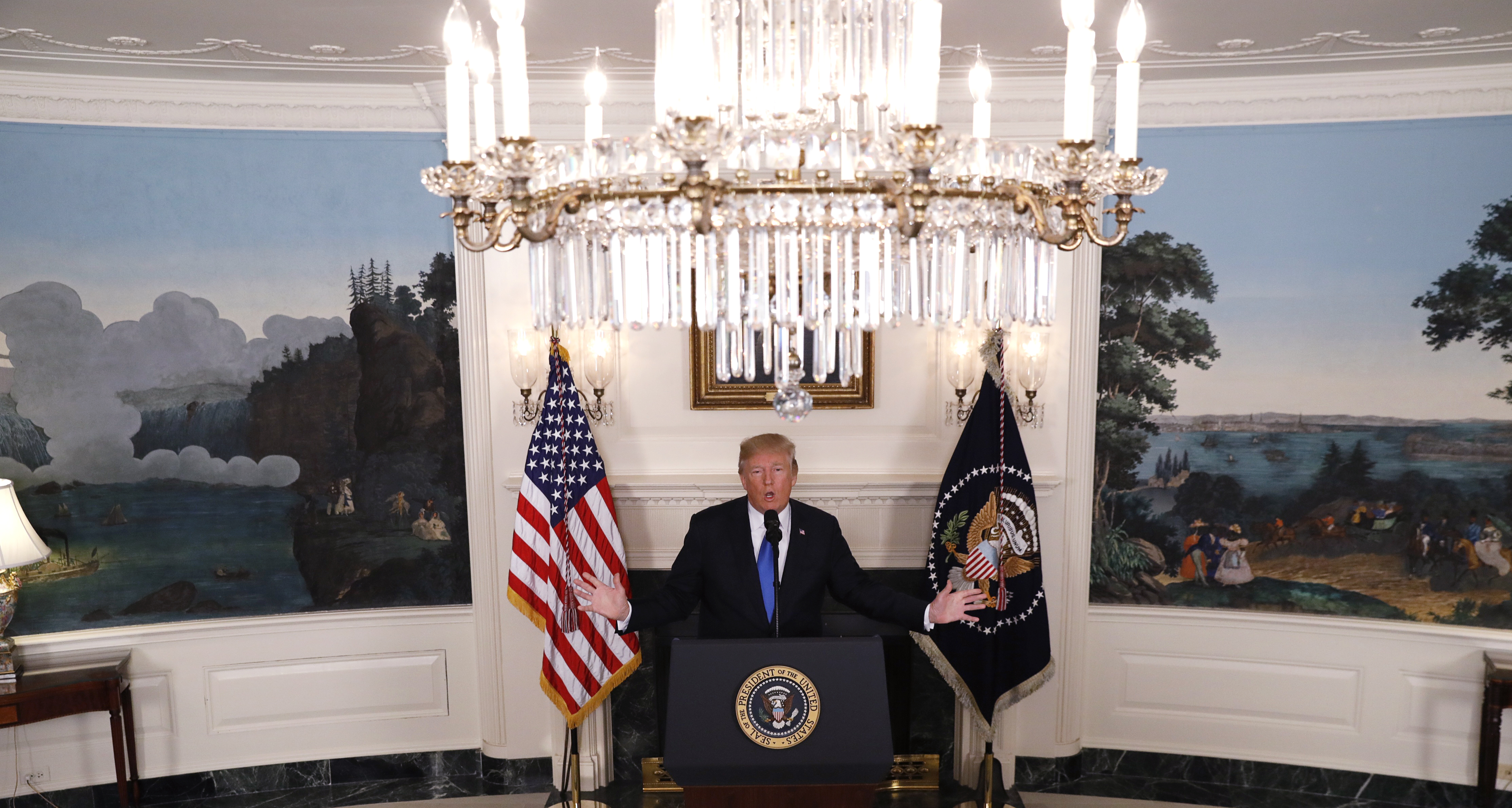The perils of Trump's disastrous Iran decision
Make no mistake: This could be the first step down a slippery slope that leads to war


In a sadly predictable move, President Trump has drastically escalated his attacks on Iran, criticizing them on Friday for a laundry list of things, accusing them of not adhering to the "spirit" of the 2015 nuclear deal, and taking umbrage that Iran continues to be a regional power that won't take U.S. dictation. But most importantly, Trump not only announced that he is decertifying the nuclear deal (which eased sanctions on Iran in exchange for Tehran effectively abandoning its pursuit of nuclear weapons), but also branded the Islamic Revolutionary Guard Corps — a military branch of the Iranian government — a terrorist organization, and levied specific sanctions on them.
In tone and substance, Trump's speech was still more restrained than the warmonger caucus would have liked. He didn't unilaterally breach the deal, as neocons had been pushing him to. Still, it is a thumb in the eye of Iran — especially the IRGC designation — and could easily lead to an escalating tit-for-tat, just like the president's constant stupid blustering has done with North Korea.
To wit:
The Week
Escape your echo chamber. Get the facts behind the news, plus analysis from multiple perspectives.

Sign up for The Week's Free Newsletters
From our morning news briefing to a weekly Good News Newsletter, get the best of The Week delivered directly to your inbox.
From our morning news briefing to a weekly Good News Newsletter, get the best of The Week delivered directly to your inbox.
"This is reckless beyond the extreme," said Barbara Slavin, an Iran expert at the Atlantic Council. "The reason being is that to designate the armed forces of another country as terrorists is to invite retaliation. Would the designation mean that U.S. drone attacks on IRGC personnel are fair game? If so, expect to see Iranian proxies start killing U.S. military personnel again in Iraq or in Afghanistan or Syria." [BuzzFeed News]
Now, the decertification itself does not automatically change anything. Instead, Congress now gets 60 days to decide if it wants to re-impose sanctions, under an expedited process immune to a filibuster, or change the terms of the deal with a new bill. And so, perhaps the most important question now is whether Democrats — especially in the Senate — will stand up for President Obama's most important foreign policy accomplishment — and try to prevent war with Iran.
So far, it doesn't look good.
Republican Sens. Bob Corker (Tenn.) and Tom Cotton (Ark.) are already ready to serve Trump with a new bill — which could be filibustered — that would unilaterally change the terms of the Iran deal, by removing its sunset provisions and increasing limitations on advanced centrifuges. (One key point of the agreement was that if Iran showed good faith, it could eventually get out from under some of the requirements by 2025, and be treated more like any other nation — though as Ali Vaez explains, many requirements last until 2030 or 2045, and stringent inspections by the International Atomic Energy Agency will continue indefinitely.)
Because Iran is abiding by the agreement, the warmonger caucus wants to add these new conditions that Tehran never agreed to, so it might violate those instead. It is, as Daniel Larison argues, "a blatant show of bad faith from our side."
A free daily email with the biggest news stories of the day – and the best features from TheWeek.com
It's important to understand what conservative and neoliberal hawks alike seem to be after here: If they bait the Iranians into breaching the agreement first, the warmonger caucus will be able to start a cycle of escalation that ends in war, all while being able to claim that we didn't start it.
This would obviously be disastrous.
Remember that despite Trump's claims that Iran has violated the "spirit" of the deal, impartial observers agree that Tehran is very much keeping up its end of the bargain. Trashing the deal serves no purpose beyond conjuring new and frightening problems where none otherwise existed.
For starters, Trump's bogus claims about Iran raise the possibility that a massive pressure campaign will lead Congress to simply re-impose sanctions, thus destroying the deal immediately. That might also happen if Democrats allow themselves to be steamrolled, and Congress changes the terms of the deal via the Corker-Cotton bill. If America unilaterally changes the terms of the deal, it is quite likely that it will eventually collapse.
If American lawmakers kill the deal, it's still possible that Iran will continue to abide by the terms with the rest of the parties, and the United States will just be badly diplomatically isolated for no reason. However, Iran might also conclude that with the deal in tatters, and with American policy in the hands of a mentally unhinged maniac, its best move is to carry out a crash attempt to develop a nuclear deterrent — raising the possibility of a nuclear arms race in a very unstable part of the world.
Make no mistake: This could be the first step down a slippery slope that leads to war. Imagine the howling from hawks here in the U.S. if Iran restarted its nuclear weapons program. Imagine how President Trump would handle that. It is well within the realm of possibility that he would invade Iran.
This would be catastrophic. The American military is badly overstretched and exhausted after 16 years of continuous warfare across half the globe — and this time there would not be any significant help from Europe. The Iranian military is surely no match for America's, but it is also much more formidable than Iraq's rattletrap forces in 2003, and Iran is much larger physically, with over twice the population. Such an invasion might not be nearly the cakewalk that toppling Saddam Hussein was.
And, of course, it would be a horrific, bloody nightmare within Iran. Even if Iran's conventional forces were defeated, there is an absolute certainty of a long, brutal guerrilla war, causing hundreds of thousands of civilian casualties and costing trillions of dollars. It would almost certainly displace the Iraq invasion as the worst foreign policy decision in the history of the United States.
That is why European parties to the deal (the EU announced on Friday it will stick to it) and a handful of Republicans in Congress have been arguing that the U.S. must stick to the deal so long as Iran is doing so. And so long as Senate Democrats can hold together, they can at least filibuster the Corker-Cotton bill. (If Congress does nothing, the deal would remain.)
Yet Democrats have so far been shockingly cavalier about undermining the deal. There is a wide streak of anti-Iran sentiment within the party — and every single Senate Democrat voted to impose new sanctions in June (only Bernie Sanders and Rand Paul voted against). Here's hoping they can discover some sense in time to stop this catastrophe.
Ryan Cooper is a national correspondent at TheWeek.com. His work has appeared in the Washington Monthly, The New Republic, and the Washington Post.
-
 Time blindness: is being late a disorder?
Time blindness: is being late a disorder?In The Spotlight Understanding the cause of chronic tardiness can save a relationship
-
 Quiz of The Week: 3 – 9 January
Quiz of The Week: 3 – 9 JanuaryQuiz Have you been paying attention to The Week’s news?
-
 The Week Unwrapped: Is Elon Musk’s AI tool a platform for abuse?
The Week Unwrapped: Is Elon Musk’s AI tool a platform for abuse?Podcast Plus can Mumsnet predict who will be the next PM? And who is still watching Avatar sequels?
-
 The billionaires’ wealth tax: a catastrophe for California?
The billionaires’ wealth tax: a catastrophe for California?Talking Point Peter Thiel and Larry Page preparing to change state residency
-
 Bari Weiss’ ‘60 Minutes’ scandal is about more than one report
Bari Weiss’ ‘60 Minutes’ scandal is about more than one reportIN THE SPOTLIGHT By blocking an approved segment on a controversial prison holding US deportees in El Salvador, the editor-in-chief of CBS News has become the main story
-
 Has Zohran Mamdani shown the Democrats how to win again?
Has Zohran Mamdani shown the Democrats how to win again?Today’s Big Question New York City mayoral election touted as victory for left-wing populists but moderate centrist wins elsewhere present more complex path for Democratic Party
-
 Millions turn out for anti-Trump ‘No Kings’ rallies
Millions turn out for anti-Trump ‘No Kings’ ralliesSpeed Read An estimated 7 million people participated, 2 million more than at the first ‘No Kings’ protest in June
-
 Ghislaine Maxwell: angling for a Trump pardon
Ghislaine Maxwell: angling for a Trump pardonTalking Point Convicted sex trafficker's testimony could shed new light on president's links to Jeffrey Epstein
-
 The last words and final moments of 40 presidents
The last words and final moments of 40 presidentsThe Explainer Some are eloquent quotes worthy of the holders of the highest office in the nation, and others... aren't
-
 The JFK files: the truth at last?
The JFK files: the truth at last?In The Spotlight More than 64,000 previously classified documents relating the 1963 assassination of John F. Kennedy have been released by the Trump administration
-
 'Seriously, not literally': how should the world take Donald Trump?
'Seriously, not literally': how should the world take Donald Trump?Today's big question White House rhetoric and reality look likely to become increasingly blurred
